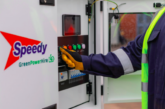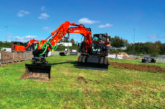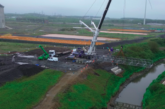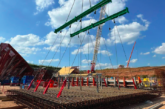
National Highways will be unveiling a new industry-wide scoring system for Connected and Autonomous Plant (CAP) to construction bosses at the Futureworx event next week.
Visitors to the industry event will be given the first look at the new CAP levels which will score machinery according to its level of automation. This standardised measure, the first of its kind, will offer clarity and a clear way to compare different types of machinery to suit different tasks.
The system is the latest development in the CAP Roadmap launched by National Highways and i3P jointly in June 2020 which identified challenges and workstreams to support a goal of making automation business as usual in construction by 2035.
The new CAP levels will establish a common language and a first-of-its-kind framework to enable connected and autonomous plant to be specified and deployed on construction schemes.
This means that all construction clients, like National Highways, can communicate clear expectations to suppliers and manufacturers can describe capability of their products using the same language.
National Highways Head of Innovation Annette Pass said: “Connected and autonomous plant offers a real opportunity to revolutionise the construction sector by making work safer, quicker and brings significant benefits for the environment.
Futureworx is the perfect platform to showcase our new CAP levels which will further our ambitious plans to introduce more connected and autonomous plant onto sites as we continue to develop the roads of the future.
CAP has the potential to improve productivity by more than £200bn by 2040 in the construction sector and we are committed to making it standard industry practice. By establishing more collaborative relationships with innovators and academics we hope to continue to lead in this field.”
The term Connected and Autonomous Plant refers to construction plant that is connected to its environment through sensors or wireless transfer of data between a remote operator while the autonomy element refers to aspects of the vehicle’s operation and also movement around a site.
The new CAP Levels Maturity Matrix offers a standardised scoring system that enables plant and machinery to be scored according to its level of automation.
An example of currently available technology is Intelligent Machine Control which guides excavators to dig to precisely the right level and profile, meaning more efficient and easier working for machine operators. In future, the operator may not need to be in the vehicle and could even control it from the other side of the world.
The roadmap and the CAP levels have been developed in collaboration with TRL – the UK-based global centre for innovation in transport and mobility – as well as i3P, Costain and over 75 industry stakeholders meaning they have been shaped by those who will be guided by them.
The ongoing digital revolution in the construction industry can increase productivity dramatically and generate billions of pounds in savings. At the same time, digital transformation can reduce disruption to the public and improve safety.
Digital technologies are increasingly being introduced in construction and opportunities arise to introduce new techniques such as automating some activities that require manual labour and human intervention but also involve risk.
National Highways’ Digital Roads strategy sets out:
- The company’s Digital Roads 2025 vision for safer and greener roads
- How the growth of digital technology and the move to electric, connected and autonomous vehicles will fundamentally change roads in the future.
The Futureworx technology showcase is taking place on 30 and 31 March 2022 at the East of England Arena, Peterborough.








